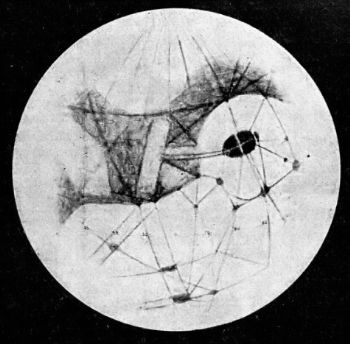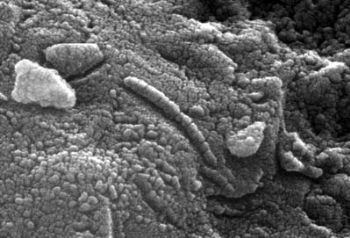by Larry
December, 2005Have the Martians Already Landed?After that assumed observation, numerous stories and novels have been written and movies made that featured Martians warring with or invading our world. Following several NASA and other fly-bys or probes, that disappointingly had revealed Mars as simply an empty, cold, rocky, and desert-like sphere, this interest was substantially revived again in 1996, when electron microscopic analysis of a meteor determined to be of Martian origin, apparently blown from the Red Planet into space by impact from a large asteroid or comet, showed what looked like extremely tiny worms that must have ridden here in their rocky "ship."
The odds of this occurring are dauntingly small. If a big asteroid were to have hit the surface of Mars at the correct angle, a portion of the planet's crust right around the new crater would have been propelled spaceward. Only a small portion of this, however, would get beyond Martian gravity and so not eventually fall back. Even if there were life ultimately found to have been on that planet, still in doubt, it has been estimated that only about 1 in 500 bits of Martian debris thus blasted away would have any possibility of primitive living things surviving in it as they were fired into space. But supposing a few Martian microbes did stow away in space rocks, they would then need to have avoided baking in the intense temperatures of the explosion or being destroyed by the perhaps 10,000 G or greater force of being hurled aloft, plus needing the tenacity to barely remain viable through tens or hundreds of thousands of millennia floating about in space, hardly a hospitable environment, in order to have had any chance of invading, let alone seeding, our planet quite a bit later. Yet if any did survive the journey to Earth intact, and still able and willing to reproduce, their next obstacle would be our atmosphere. The meteor "ships" would have been superheated and broken up by rapid exposure to Earth air. Only the minutest fraction of the original material ejected beyond Mars could have reached our world's surface. If the hypothetical Martian invaders somehow arrived, most would then have been instantly obliterated by new impacts at thousands of miles per hour. Yet optimistic proponents of an invasion from Mars hypothesis suggest that microbes, originating on a very young 4th planet and riding safely inside such meteors, successfully overcoming all odds, were then in fact released on Earth. How often might a probably millions-of-years-old microbe, once it ultimately reached terra firma have been able to get out of its rock vehicle, though the latter had been so intact it could have protected inside it a precious few Martian life forms from the forces, temperatures, and eons already noted? But even if, once in an extremely great while, one or more such still living cells were to have infected the Earth's surface, the off-worlders' next hurdle would have been the need to find an environment conducive to their ongoing sustenance, when, instead, the majority of ancient Earth may have been deadly to all but the most hearty of survivors. In the theory, this kind of invasion occurred quite early in our planet's development, so early, in fact, that an infestation from space might have accounted for the rise of all life here. In short, if the notion turns out to be accurate, our ancestors of the deep dark past may have been from another planet.
Some scientists, while admitting the odds of our Martian origins could be almost incredibly small, point out that in the ancient earth there would still have been multiple asteroid impacts keeping our sphere's surface in a tempestuous transition too intense to support life until just about 300 million years before the first fossil evidence for cellular organisms. Yet cells are actually complex, with nuclei, spirals of RNA and DNA, inner and outer parts, and systems for their replication, energy utilization, etc. A few Mars invasion theorists suggest, then, it is actually less of a leap to believe Earth's life originated on the 4th planet than to believe that, in a mere 300 million years, a portion of the then completely barren surface of Earth, with no external help, somehow transformed itself into a complicated living cell, finally capable of evolving and populating into almost every continent and environmental niche throughout our pearly world. So, have the Martians already landed, and they are us? Or is this hypothesis just another example of our long fixation with Mars, the same focus that leads to the current trillion dollar plan for manned exploration of the Red Planet in the next few decades? While I've certainly known more than a few aliens in my time, I just don't know. Doubtless some would argue the point, but it is a novel idea to think of myself as a Martian. What do you think? |

